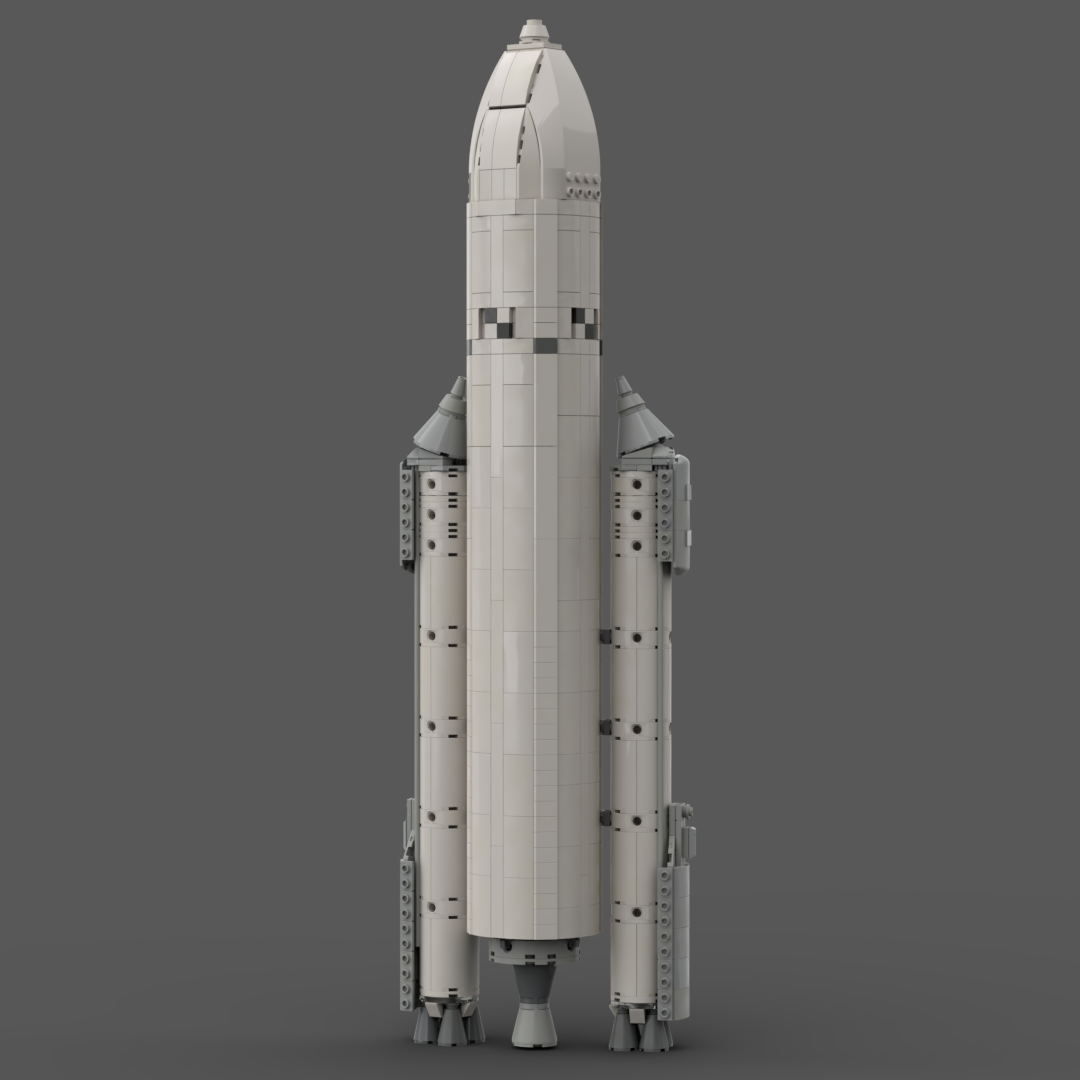
LEGO Designer:
Allan Jordan (Drscoop)
Designed:
February 2020
Categories:
Launch Vehicles, All, Heavy Lift Launch Vehicles, Space Agency - Roscosmos
Launch Vehicle Details
Stages:
Length:
Diameter:
Mass at Launch:
Low Earth Orbit Capacity:
Total Thrust:
Apogee:
Class:
Launch vehicle originally designed in the 1980’s to fulfill the third generation 20-30 metric tons to orbit launcher requirement. It was an adaptation of the Energia launch vehicle, using two strap-on booster units instead of four, and a reduced-diameter core using a single RD-0120 engine instead of four.
In the 1990’s a structural test article was built and it was proposed that several Energia-M’s be launched for commercial customers using surplus Energia components. No buyers came forward for the untested design. Development ended in 1993.
It was later proposed as an alternate for the Angara launch vehicle, but it was not accepted for that role since Angara was to be an all-Russian design (the Energia boosters were built in Ukraine).
Designer Notes
The Core booster for the Energia, Energia-M, Polyus and Buran models should have flexi tubing along the core stage but Stud.IO and LDD would not let me add these. A pearl dark grey 75c23 and 75c32 should work, but might require trimming. These should be flexible enough to work. Or search the web for “Lego compatible pneumatic hose” and similar tubing can be bought by the metre – the outside diameter is a little different so the attachment point on the nosecone might require some modification? Similarly, the vertical pipes on the side boosters are 3mm hosing, but can, I understand, be replaced with 3mm PVC rods obtainable from various hobby or craft stores…
Credits
This has evolved significantly from my old v3 Energia Buran system. Significant thanks and credit are due to the following:
- Sunder59 for the original Energia-Polyus outline design.
- KingsKnight/Andrew Harkins for the US 1:110 shuttle design that influenced the Buran design and the Energia Core tank nosecone design.
- David Welling for significant improvements to the Side Boosters for stability, and Florent Todeschini for the inspiration for the upgraded nosecones.
- Sebastian Schoen for the Polyus model, the Buran-T nosecone design and for the inspiration to re-design the core section from a 6×6 stud core to a more accurate 5×5 stud core.
Part count: 1173 bricks, 112 lots.
| Unit | width | length | height |
|---|---|---|---|
| Studs | 19.3 | 11.6 | 67.6 |
| Centimetres | 15.4 | 9.3 | 54.1 |
| Inches | 6.1 | 3.7 | 21.3 |
Downloads
- Complete Model
- PDF Instructions
Pay what you feel
This digital model is provided free of charge. However, if you like it, and you would like to thank the designer for their time, please consider a donation of your choice. 100% of your donation will go directly to the designer.
Donations can be made by following this link:
The Core booster for the Energia, Energia-M, Polyus and Buran models should have flexi tubing along the core stage but Stud.IO and LDD would not let me add these. A pearl dark grey 75c23 and 75c32 should work, but might require trimming. These should be flexible enough to work. Or search the web for “Lego compatible pneumatic hose” and similar tubing can be bought by the metre – the outside diameter is a little different so the attachment point on the nosecone might require some modification? Similarly, the vertical pipes on the side boosters are 3mm hosing, but can, I understand, be replaced with 3mm PVC rods obtainable from various hobby or craft stores…
Credits
This has evolved significantly from my old v3 Energia Buran system. Significant thanks and credit are due to the following: Sunder59 for the original Energia-Polyus outline design. KingsKnight/Andrew Harkins for the US 1:110 shuttle design that influenced the Buran design and the Energia Core tank nosecone design. David Welling for significant improvements to the Side Boosters for stability, and Florent Todeschini for the inspiration for the upgraded nosecones. Sebastian Schoen for the Polyus model, the Buran-T nosecone design and for the inspiration to re-design the core section from a 6×6 stud core to a more accurate 5×5 stud core.
Part count: 1173 bricks, 112 lots.
| Unit | width | length | height |
|---|---|---|---|
| Studs | 19.3 | 11.6 | 67.6 |
| Inches | 6.1 | 3.7 | 21.3 |
| Centimetres | 15.4 | 9.3 | 54.1 |
No external URL provided.
Launch History information from space.skyrocket.de
Launch History information from space.skyrocket.de
Related Posts
None found

